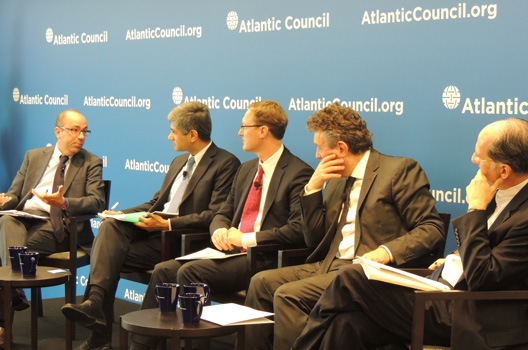 Violence in southeastern Ukraine could adversely impact the country’s economic transformation, Aasim M. Husain, deputy director of the International Monetary Fund’s European Department, told the Atlantic Council.
Violence in southeastern Ukraine could adversely impact the country’s economic transformation, Aasim M. Husain, deputy director of the International Monetary Fund’s European Department, told the Atlantic Council.
The former Yugoslavia, which broke up amid almost a decade of war in the 1990s, should serve as “a lesson to Ukraine going forward,” Husain said. “The lack of progress, or much slower progress, in former Yugoslavia, is not unrelated to the fact that the lack of a peaceful transformation held things back,” he said.
“There is nothing inherent that says in eastern Ukraine there will be violence, but if that is not addressed, the transformation will be much slower and a lot harder,” Husain told an Atlantic Council audience on December 15.
IMF Report: Economic Transitions
Eight months after Russian-sponsored militias seized power in two provinces of southeastern Ukraine, the government of President Vladimir Putin has continued to arm and reinforce those groups, according to recent accounts from NATO, US President Barack Obama, the Ukrainian government, Russian and Western journalists, the Russian Soldiers’ Mothers’ Committees and independent analysts. The Kremlin and its state-controlled media deny those reports, saying that Russian troops and paramilitary forces fighting in Ukraine are doing so as volunteers or during their vacations. The US and European Union have imposed sanctions on Russia over its role in the conflict.
Husain and other analysts discussed the Ukraine conflict during an Atlantic Council forum that served as the US debut of an IMF special report, 25 Years of Transition: Post-Communist Europe and the IMF.
A quarter-century after the fall of communism and a few years after the 2008 global financial crisis, former Communist states are again at a “crucial inflection point” as “developments in Ukraine, the legacy of corruption in Kyiv, and a return, unfortunately, to more authoritarian government in some of these former Communist countries now threatens to hinder or reverse political and economic progress,” said Daniel Price, member of the Atlantic Council board and managing director of Rock Creek Global Advisors.
Russia’s neighbors are warily watching the security implications for them of Moscow’s interventions in Ukraine and other ex-Soviet states. Noting that Latvia is “not in the easiest part of Europe,” Latvia’s ambassador to the US, Andris Razans, said the “big enigma” in Europe is in what way developments in Russia will affect European security.
Husain said that even before the crisis erupted in Ukraine in November of 2013, the country faced several challenges, including:
- Large fiscal imbalances marked by high debt and high deficit;
- An exchange rate that was considerably overvalued;
- Energy prices that were heavily subsidized in an unsustainable way that was costing the state huge amounts of money;
- Structural weaknesses, including major issues with the business climate and reforms that had not gotten underway.
“This was an economy in clear need of major structural change and major changes in addressing macroeconomic imbalances,” said Husain. The reforms undertaken in Ukraine over the past year are a step in the right direction, but “there is a lot to do,” he said.
The December 15 meeting marked the launch of the “Euro Growth Conversation Series,” a new component of the Atlantic Council’s Global Business and Economics Program, led by program director, Andrea Montanino.
As part of this series, economists, private sector leaders, and government officials from the US and Europe will discuss ways to foster growth in European economies.
Ryszard Schnepf, Poland’s ambassador to the US, attributed his country’s successful economic transformation to a can-do attitude of the Polish people, a cheap and technologically advanced labor force, and the leadership provided by the late Lech Walesa, Poland’s first post-communist president.
The IMF report highlights the “dramatic transformation in Europe’s former communist countries” over the past twenty-five years. This transformation has been marked by reintegration into the global economy and significant improvement in living standards.
Economic reforms were rapid in the early years, but then tended to slow down, even in countries where they were far from complete, said James Roaf, senior resident representative of the IMF’s regional office for Central and Eastern Europe in Warsaw.
What needs to be done? “Our answer is more reform,” he said. Roaf said many countries face a number of challenges, including:
- Fiscal: Countries, mostly in Southeast Europe, have major fiscal problems;
- Demographic: Countries face a major drop in working-age populations. Central Eastern Europe, in particular, is hit by a “double whammy” as overall population levels are falling;
- Labor market: This is a big issue in Southeast Europe and the Western Balkan countries.
“We’re expecting continued rather subdued growth in the region,” but if countries undertook reforms the IMF projects a significant uptick in growth, said Roaf.
“This is a story of success, but there is a possibility of more success down the road,” he added.
Mark Sobel, US deputy assistant secretary of the treasury for IMF policy who worked on transition economies in the early 1990s, said the IMF report lists “high-class problems these days in comparison to what we were dealing with in the early years.”
“Maybe that’s a backhanded way of saying it is a success story. But obviously there is a lot of work to be done,” he added.
Ashish Kumar Sen is an editor at the Atlantic Council.
